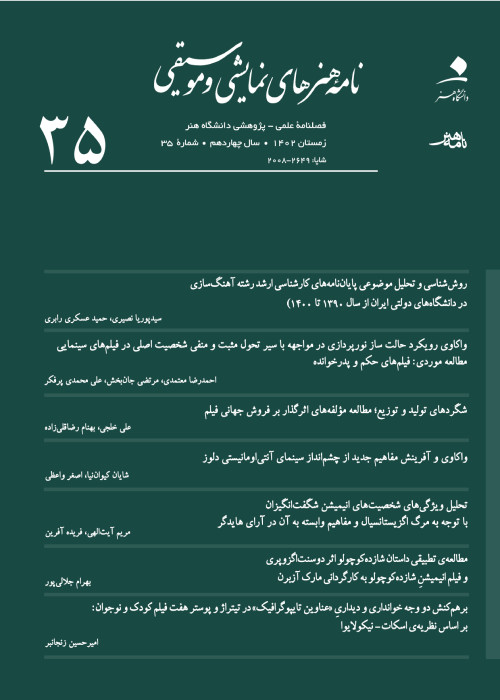Aesthetic Aspects of Reflexive Documentary with Emphasis on Works of Errol Morris
Author(s):
Abstract:
In the last two decades a specific branch of documentary film has been emerged. This new approach to documentary filmmaking has some particular characteristics: challenging the aesthetics of realism in documentary cinema, emphasizing on importance of identity and focusing on interpretation of documenter and using some cinematic devices which traditionally belong to fiction films. This new style of documentary filmmaking is called Reflexive Documentary. Reflexive Documentary is deeply under influence of modern epistemology. The relationship between the documenter and reality has been re-speculated and the so called axiomatic principles of conventional documentary aesthetics, has been challenged by that. Reflexive Documentary tries to suggest a new experience in documentary cinema. To achieve that goal it has invented its own
Method
using formal and political strategies, intentionally using cinematic devices like re-made scenes, estranging the spectator through means, apprising the audience about filmmaking process and stressing on the permanent distance between the subject and the object. Reflexive Documentary always admits the difference between the film and outer world. It never wants to fill this distance neither to solve the contradictions, rather by its criticizing perspective, it makes them even more noticeable for the audience. This distance gives the chance of having an active/critical stand point of view to the audience. It makes the audience to be aware of the fact that the absence of truth is a permanent status. In addition to estranging the spectator, self-awareness, irony and parody, there are other techniques which can actualize the political and formal strategies of Reflexive Documentary: using non-diegetic sounds and editing devices. Those devices could be found and also could be the subject of analysis in the outstanding films of this style. In this article the characteristics of the style has been introduced by using the theories developed by the film philosophy theoretician, Bill Nichols. He believes the emersion of this style was a remonstrative reaction to the conventional documentary filmmaking. According to this approach, the documenter can never show an event as if there was no camera there. She can never claim that the truth has been documented completely. Reflexive Documentary questions itself and it is the most self-aware method of referencing to the outside world. It has a pessimistic view towards classical documentary values such as totally realistic depiction of the word, the possibility of having camera as a non-interfering witness and the putative relation between an image and what it depicts. This article tries to give an understanding of creative use of possibilities or in Bill Nichols term reflexive strategies, in both formal and political aspects, by focusing on one of the most significant documentary filmmaker of our time, Errol Morris. This approach is clearly recognizable in his distinguished films like The Thin Blue Line, Mr. Death: The Rise and Fall of Fred A. Leuchter, Jr. and The Fog of War: Eleven Lessons from the Life of Robert S. McNamara. Errol Morriss documentaries use different kinds of devices to raise questions about verisimilitude and validity of documentary film. The ultimate goal of using those devices is to reverse the presumed realism in documentary film. The success of this method is based on focusing on the audiences who are not passive and try to investigate the assertions about the truth.Keywords:
Language:
Persian
Published:
Journal of dramatic Arts and Music, Volume:6 Issue: 11, 2016
Pages:
39 to 50
magiran.com/p1556252
دانلود و مطالعه متن این مقاله با یکی از روشهای زیر امکان پذیر است:
اشتراک شخصی
با عضویت و پرداخت آنلاین حق اشتراک یکساله به مبلغ 1,390,000ريال میتوانید 70 عنوان مطلب دانلود کنید!
اشتراک سازمانی
به کتابخانه دانشگاه یا محل کار خود پیشنهاد کنید تا اشتراک سازمانی این پایگاه را برای دسترسی نامحدود همه کاربران به متن مطالب تهیه نمایند!
توجه!
- حق عضویت دریافتی صرف حمایت از نشریات عضو و نگهداری، تکمیل و توسعه مگیران میشود.
- پرداخت حق اشتراک و دانلود مقالات اجازه بازنشر آن در سایر رسانههای چاپی و دیجیتال را به کاربر نمیدهد.
In order to view content subscription is required
Personal subscription
Subscribe magiran.com for 70 € euros via PayPal and download 70 articles during a year.
Organization subscription
Please contact us to subscribe your university or library for unlimited access!



